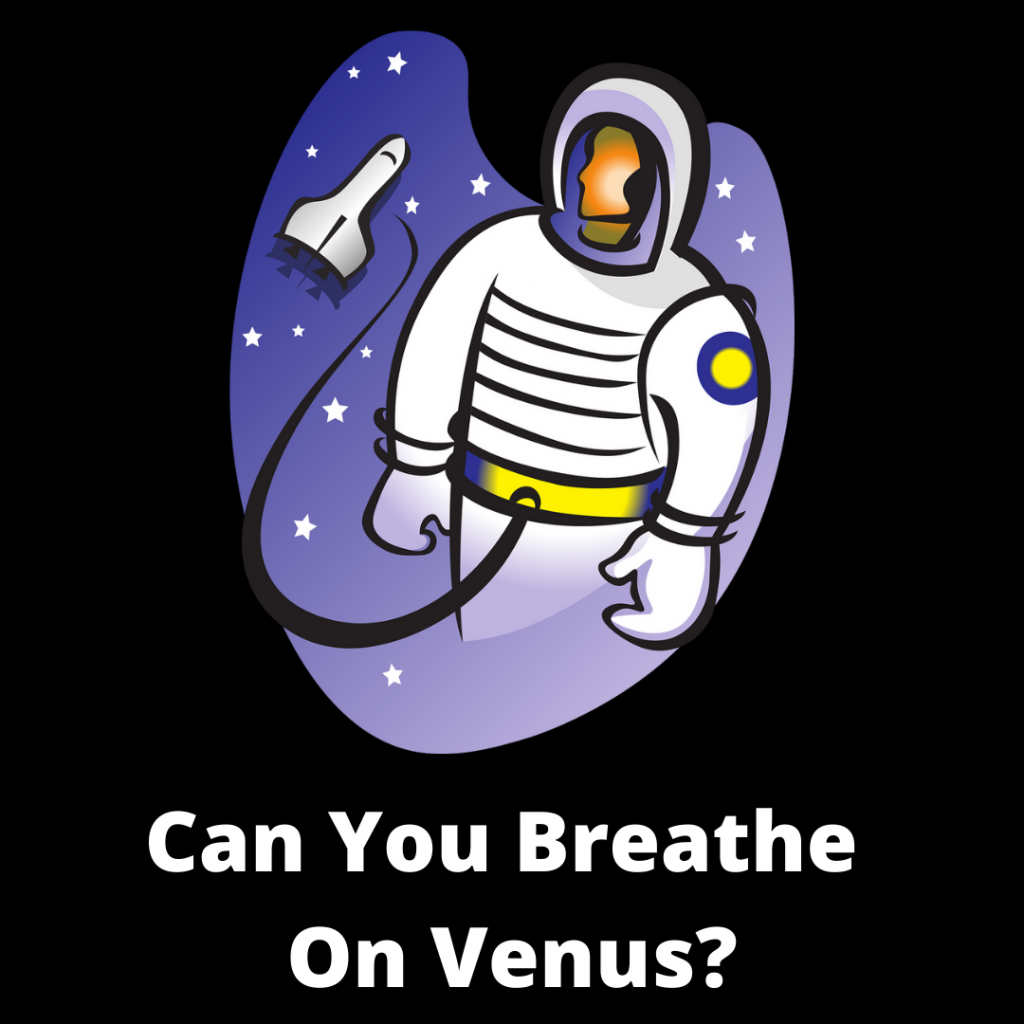No, you cannot breathe on Venus.
In fact, any attempt to really get close enough to Venus would probably result in death even before you took off your helmet to try and take a breath.
In the article that follows, we’ll explain.
Can You Breathe On Venus? (EXPLAINED)
Relevant Facts About Venus
Venus is the second closet planet to the sun.
It is terrestrial, meaning it is solid, like Earth, Mars, and Mercury.
Venus is not far from Earth, and is about the same size as Earth.
This is why some like to call Venus Earth’s twin.
But that’s where the similarities end.
Venus is actually a hellish place.
30 miles of clouds of sulfuric acid envelope the planet.
The clouds trap heat from the sub, pushing the temperature on the surface of the planet to well over 800 degrees Fahrenheit.
The atmosphere is composed of mostly carbon dioxide.
And finally, while the gravity is similar to Earth, the dense atmosphere plus that gravity creates significant air pressure.
Several probes have been to Venus.
The ones that landed or crashed there perished rather quickly.
One probe managed 2 hours, while another failed at just 23 minutes.
Relevant Facts About Human Respiration
Human need to breathe in oxygen consistently, but not as much as you’d think.
The air that we breathe on the surface of the planet is only about 21% oxygen.
Close to 78% of the air we breathe is actually nitrogen, along with traces of other gases like argon, helium, and carbon dioxide, among others.
We handle breathing air that has less oxygen in it, as we do when we ascend to higher altitudes.
We can also handle breathing air that has more oxygen in it, as we do sometimes while in the hospital.
But humans cannot survive breathing air that is 100% oxygen.
The body takes in too much oxygen, which can then cause damage to the nervous system and other delicate tissues.
If the substances the human breathes in does not have enough oxygen in it, the individual will loose consciousness or even die.
Why Can’t Humans Breathe On Venus?
Well, first of all, the primary reason that we can’t breathe on Venus is that we can’t even really get there without dying.
To get to the atmosphere of Venus, or even to the surface, we would have to approach closer to the sun, risking a fatal dose of radiation.
If we can get to orbit around the planet, we still have to pass through the 30 miles of sulfuric acid clouds without suffering catastrophic damage to the ship.
If we can get through the clouds, we’d have to battle the intense air pressure.
Near the surface, the pressure is close to what a human would experience 3,000 feet under the surface of the ocean.
Not to mention that the blistering heat (800 degrees Fahrenheit) is hot enough to melt much of your spacesuit components, all the plastic, and even some metal pieces of the ship.
But let’s say that we’ve found a way to overcome the pressure, the heat, the acid, and the radiation.
What’s left is the actual “air” you’d be trying to breathe on Venus.
It is carbon dioxide.
A human can’t survive breathing carbon dioxide.
There’s no oxygen in pure carbon dioxide.
Without oxygen in the breath that a person inhales in, it might as well be the same as if the human was holding her breath, for all the good it would do her.
There’s also a question of whether it would be physically possible for the human to take a breath of the carbon dioxide into the body at such significant pressure.
It is hard to say how long it would take to die on Venus if you decided to take off your helmet while on it’s surface.
But it’s a pretty safe guess that the timeline would be extremely short.
(Remember, it is 800 degrees Fahrenheit on the surface).
Did You Know? (Other Facts About Venus)
Here are some facts you may not have known about Venus:
- Scientists believe that the carbon dioxide atmosphere of Venus was created by ancient volcanic activity.
- Venus rotates in the opposite direction that Earth does. As a result, you’d wake up to the sun rising in the west and watching it set in the east.
- If you could smell on Venus without instantly dying, it would probably smell a lot like rotten eggs.
- Like Mercury, Venus has no moons. The remainder of the planets in our solar system, even the dwarf planet Pluto, all have moons of their own.
- We often portray Venus as a yellow color. But the color of Venus we see from afar is the color of the clouds. The surface of Venus is probably reddish or brownish.
- Venus spins really slowly, completing one rotation every 243 Earth days or so. This slow rotation is one of the explanations for why Venus has no magnetic field.
- Venus is named after the Roman goddess of love. This is somewhat comedic, since Venus is volcanic, acidic, toxic, deadly, difficult, and has crushed anything that has dared get close to her.
- The surface features of Venus are also named for famous women, including Sacajawea, Diana, Ishtar Terra and Aphrodite Terra.
- There may have been a time when Venus was a habitable planet.
- There are no rings around Venus.
Wrap Up
Venus is a fascinating planet, and we look forward to learning more about it as the progress of space exploration continues.
Other
You might also enjoy:







